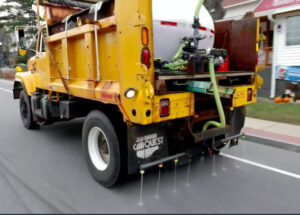By Cathy DeDe, Chronicle Managing Editor
I’m super-excited about road salt, and I’m not the only one!

On Feb. 10, the Fund For Lake George held a virtual meeting and screening of a new 30-minute video called “The Road Map to Road Salt Reduction: Success Stories from Lake George.”
The Zoom program drew more than 120 elected officials, highway superintendents, DPW staff, media, environmental observers and others from across the Northeast.
The thrust: How the Towns of Lake George and Hague and Warren County improved the environment and cut costs significantly by reducing use of salt in combatting winter snow and ice on roadways.
Here’s a baker’s dozen of takeaways from Wednesday’s program.
• First, let’s talk ‘brining.’ It treats roads pre-storm with a layer of salty water that prevents ice and snow from bonding to cold roads. It greatly eases snow and ice removal, we were told.
• Know the nozzles. When it looks like a plow truck is watering the road through a row of nozzles, they’re probably brining.
• It saves money. The municipalities said the savings on fuel, labor and overtime resulted in as much as 50 percent cost reduction for snow removal. And, come spring, there’s no sand-salt mix to clean up from the side of the road.
• ‘We can be done when the storm is done.’ When they get the brining just right, there’s no more time or effort needed to move snow or keep sanding or de-icing after the storm has passed.
• ‘Salt is the acid rain of our time,’ said Eric Siy, the FUND for Lake George’s executive director. He said brining reduces sodium chloride leaching into soil, Lake George, streams, groundwater and drinking water. The FUND’s Waterkeeper Chris Navitsky said salt corrodes appliances, damages trees at root-level, contaminates drinking water and causes “heavy” water that inhibits the natural and necessary seasonal turnover of the lake water.
• DPW guys are the best! They are still mostly guys, and the ones featured in the video — from Hague, Lake George, and Warren County DPW — are intelligent, resourceful and enthused about doing a better job while also saving the lake. Where they didn’t have money to buy new equipment for brining, they made do with a spare part here, repurposed hose there, a pump system taken from another vehicle. Reminds me of craft brewers who “Frankenstein” systems from salvaged parts.
• They know their roads. Which curve has overhanging trees that will drop a lot of snow, which intersections to focus on.
• Solar-powered camera systems keep an eye out. Transmitting images, precipitation and other measurements to the DPW office, they reduce the need for drivers to go out in person to check roads. Truck dashboards are technological centers too. Drivers can calibrate the treatment needed based on actual conditions, increasing efficiency and reducing waste. “It takes some getting used to,” they said, but that it is worth the learning curve.
• Plows have gone high tech. New improvements include “live edge” plows whose sectional bottom edges connect more flexibly with the rough road surface, thus moving more snow more efficiently.
• Municipalities are making their own brine. DPWs mix it at pennies or less per gallon, saving time and money.
• Less year-round effort required. Those piles of sand we see at the DPW? They make their own, sifting fill removed during other projects. I think it was Lake George that showed a mountain of sand they barely needed to use in several years.
• They seek the public’s participation. Particularly in more developed areas, for every “lane mile” of roadway where salt use is being reduced, there is typically more surface area devoted to parking lots for businesses, driveways and private roads. They urge less salt use there. “We need a region-wide effort” was the thrust.
• Want to see the video yourself? Tune in at www.fundforlakegeorge.org.
Copyright © 2021 Lone Oak Publishing Co., Inc. All Rights Reserved.
 Glens Falls Chronicle Serving the Glens Falls/Lake George region; Warren, Washington and northern Saratoga counties since 1980
Glens Falls Chronicle Serving the Glens Falls/Lake George region; Warren, Washington and northern Saratoga counties since 1980

